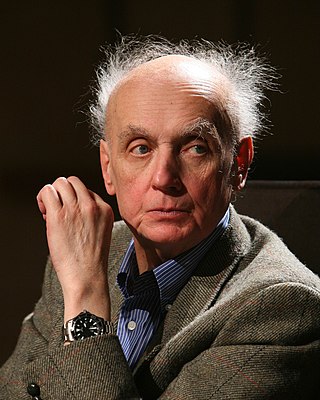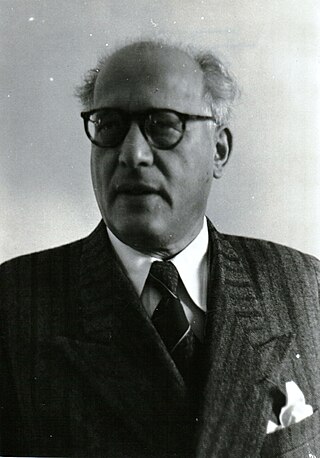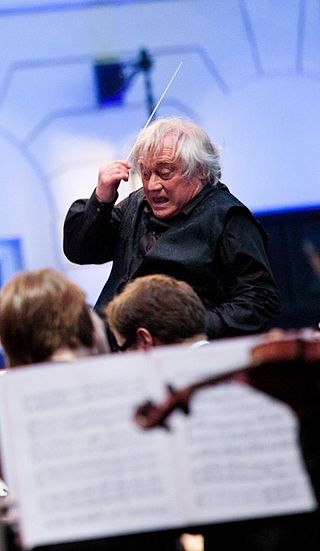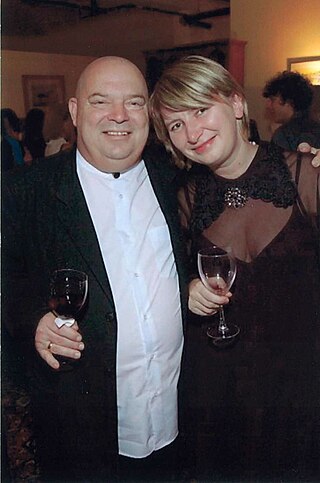
Wojciech Kilar was a Polish classical and film music composer. One of his greatest successes came with his score to Francis Ford Coppola's Bram Stoker's Dracula in 1992, which received the ASCAP Award and the nomination for the Saturn Award for Best Music. In 2003, he won the César Award for Best Film Music written for The Pianist, for which he also received a BAFTA nomination. In 2012, he became the recipient of Poland's highest distinction, the Order of the White Eagle.

Mieczysław Karłowicz was a Polish composer and conductor.

Karol Maciej Szymanowski was a Polish composer and pianist. He was a member of the modernist Young Poland movement that flourished in the late 19th and early 20th century.

István Kertész was a Hungarian orchestral and operatic conductor who throughout his brief career led many of the world's great orchestras, including the Cleveland, Chicago, Philadelphia, New York, Los Angeles, Pittsburgh, Detroit, San Francisco and Minnesota Orchestras in the United States, as well as the London Symphony, Vienna Philharmonic, Berlin Philharmonic, Royal Concertgebouw Orchestra, Israel Philharmonic, and L'Orchestre de la Suisse Romande. His orchestral repertoire numbered over 450 works from all periods, and was matched by a repertoire of some sixty operas ranging from Mozart, Verdi, Puccini and Wagner to the more contemporary Prokofiev, Bartók, Britten, Kodály, Poulenc and Janáček. Kertész was part of a musical tradition that produced fellow Hungarian conductors Fritz Reiner, Antal Doráti, János Ferencsik, Eugene Ormandy, George Szell, János Fürst, Peter Erős, Ferenc Fricsay, and Georg Solti.

Stanislaw Pawel Stefan Jan Sebastian Skrowaczewski was a Polish-American classical conductor and composer.

Witold Roman Lutosławski was a Polish composer and conductor. Among the major composers of 20th-century classical music, he is "generally regarded as the most significant Polish composer since Szymanowski, and possibly the greatest Polish composer since Chopin". His compositions—of which he was a notable conductor—include representatives of most traditional genres, aside from opera: symphonies, concertos, orchestral song cycles, other orchestral works, and chamber works. Among his best known works are his four symphonies, the Variations on a Theme by Paganini (1941), the Concerto for Orchestra (1954), and his cello concerto (1970).
Ilya Kaler is a Russian-born violinist. Born and educated in Moscow, Kaler is the only person to have won Gold Medals at all three of the International Tchaikovsky Competition ; the Sibelius ; and the Paganini.

Grzegorz Fitelberg was a Polish conductor, violinist and composer. He was a member of the Young Poland group, together with artists such as Karol Szymanowski, Ludomir Różycki and Mieczysław Karłowicz.

Antoni Wit is a Polish conductor, composer, lawyer and professor at the Fryderyk Chopin University of Music. Between 2002 and 2013, he served as the artistic director of the Warsaw National Philharmonic Orchestra.

Jerzy Jan Maksymiuk is a Polish composer, pianist and orchestra conductor.
Bohdan Wodiczko was a Polish conductor and music teacher.
The Chopin University of Music is a musical conservatorium and academy located in central Warsaw, Poland. It is the oldest and largest music school in Poland, and one of the largest in Europe.

Wanda Wiłkomirska was a Polish violinist and academic teacher. She was known for both the classical repertoire and for her interpretation of 20th-century music, having received two Polish State Awards for promoting Polish music to the world as well as other awards for her contribution to music. She gave world premiere performances of numerous contemporary works, including music by Tadeusz Baird and Krzysztof Penderecki. Wiłkomirska performed on a violin crafted by Pietro Guarneri in 1734 in Venice. She taught at the music academies of Mannheim and Sydney.

Witold Maliszewski was a Polish composer, founder of Odessa Conservatory, and a professor of Warsaw Conservatory.

Piotr Janowski was a Polish violinist and first Polish winner of the Henryk Wieniawski Violin Competition.

The Polish National Radio Symphony Orchestra is one of Poland's radio orchestras and premier musical institutions. It was founded in 1935 in Warsaw and was later re-established in Katowice in 1945. Since 2006 it has been a "National Cultural Institution".

The Kraków Philharmonic Orchestra or the Symphony Orchestra of the Karol Szymanowski Philharmonic is a professional symphony orchestra based in Kraków, Poland. The national status of the orchestra is reflected in its program of events, including weekly symphonic concerts in the Wawel Royal Castle, or at the Jagiellonian University's Collegium Novum, and prominent Kraków churches. The company is more active professionally than any other philharmonic orchestra in the country.

The Ignacy Jan Paderewski Pomeranian Philharmonic has been at its present site in Bydgoszcz, Poland, since 16 November 1953. It bears the name of Polish pianist and composer Ignacy Jan Paderewski. The Pomeranian Philharmonic is the musical center of Kuyavian-Pomeranian Voivodeship and also features an outdoor art gallery. It is registered on the Kuyavian-Pomeranian Voivodeship Heritage List.
Lithuanian Rhapsody in A minor, Op. 11 is the third of Mieczysław Karłowicz's six symphonic poems. A typical performance lasts 18—20 minutes.
Jadwiga Szamotulska was a Polish pianist, pedagogue, translator of art-song lyrics and librettos, university instructor at the Academy of Music in Kraków in Kraków, performing artist with the National Philharmonic in Warsaw in Warsaw, and voice coach for the soloists of the Grand Theatre, Warsaw.
















